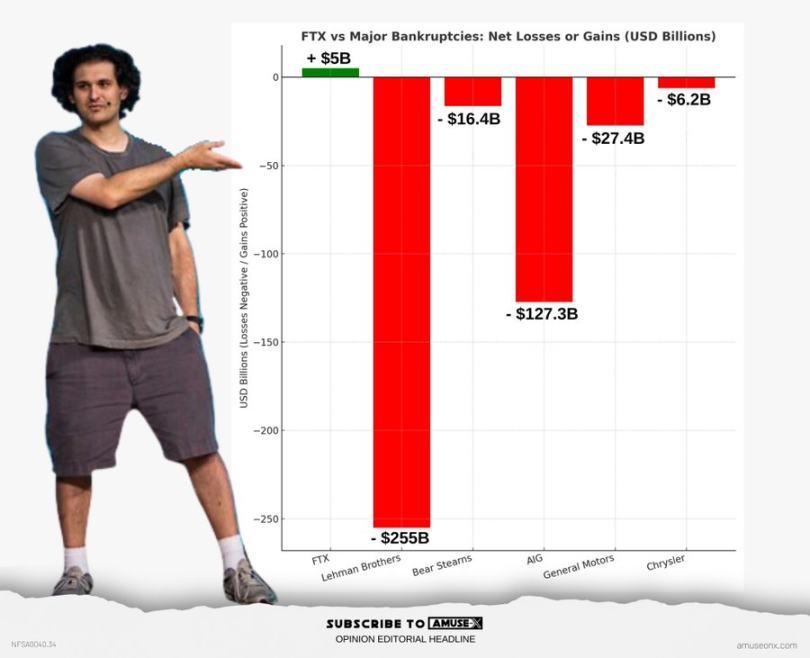By @amuse Translated by AididiaoJP, Foresight News
SBF’s story does not end in the courtroom where he was sentenced, but continues in spreadsheets, balance sheets and forgotten ledgers.
The materials tell a story that is completely different from the version the public hears.
Through the prison's slow, monitored email system, and through friends, I corresponded with SBF. In his letters, he appeared calm, analytical, and reflective. He read voraciously in science fiction, immersed in fictional worlds, perhaps because in the real world, the company he founded had been dismantled by lawyers who understood neither cryptocurrency nor the fundamentals of business. He had lost weight and become quieter.
And what he has to say now is worth listening to, because the official version of FTX’s collapse may be one of the most serious distortions of financial truth in recent years.
According to data provided by SBF, FTX never fell into insolvency. Neither in November 2022, when he handed over control under legal and regulatory pressure, nor at the time of the market's trough. According to his calculations, at the time of the bankruptcy filing, FTX had $15 billion in assets and only $8.4 billion in liabilities. He believes this significant difference should have served as a safety net to protect customers and creditors.
Instead, bankruptcy lawyers declared the company “irretrievably bankrupt” and sold off its assets at fire-sale prices. Every creditor has now been repaid in full or even more, but billions of dollars that could have been recovered were wasted on exorbitant legal fees, legal battles, and decisions made by people who “had no idea what they were doing.”
The mainstream narrative paints FTX as a house of cards, a madcap enterprise run by a founder who behaved erratically, commingled funds, and defrauded investors. But the deeper truth is far more complex.
FTX's operating model resembles that of many fast-growing tech startups: rapid iteration and rapid trial and error in areas where the law is still underdeveloped. SBF now acknowledges the irony that the company's true weakness wasn't fraud, but compliance. They spent too much energy trying to satisfy regulators who were more concerned with punishment than guidance.
“Our developers were spending half their time dealing with regulatory red tape,” he told me. “Instead of focusing on building risk management systems and security measures, we were producing reports that no one read and presentations that no one believed.” He believed this distraction was fatal. When the market panic hit, FTX’s internal systems were overwhelmed by bureaucracy, its leadership was exhausted, and its founders were inundated with conflicting legal advice.
When the crisis hit, SBF did what most people would do under pressure: he sought expert help. The problem was that these experts' interests weren't aligned with his original goal of protecting his clients. Their motivation was to push through bankruptcy proceedings, take control, and then charge hourly fees. "They applied tremendous pressure," he says. "Promises were made and then reneged on the very next moment." Looking back, he considers that his biggest mistake: backing down rather than standing his ground.
“FTX was clearly solvent and well-funded,” he told me, “but the customers had a right to seek compensation, and everyone told me at the time that it was in the customers’ best interest to hand over control. And what happened? It actually helped the lawyers.”
This involves a moral distinction rarely discussed publicly. SBF emphasized that accepting responsibility is not an admission of guilt. Responsibility means choosing to be a proactive rather than reactive participant in events, openly acknowledging one's role in shaping them. In this vein, he doesn't deny his errors of judgment. He deeply regrets: surrendering control when leadership was most needed; failing to effectively monitor Alameda's risk exposure; and focusing too much on regulatory maneuvering at the expense of operational management. But he also refuses to accept the stigma of being a "thief who stole billions of dollars." He believes his true failure lies in leadership, not theft.

None of the executives of Lehman Brothers, Bear Stearns, AIG, General Motors, or Chrysler went to jail.
If this sounds like rewriting history, consider the facts: Thanks to the appreciation of its assets, the bankruptcy estate has paid creditors billions of dollars in excess of their original claims. This means every customer and every creditor has received their full money back, or even more; no one has actually lost money. This was not the case for the victims of the aforementioned large companies. Yet, while the executives of those companies remain disgraced and at large, SBF faces years in prison, even though the data shows that the company he helmed simply suffered a liquidity crisis exacerbated by panic and poor advice.
The real winners were those who inherited his legacy: the lawyers, consultants, and experts who collected more than a billion dollars in fees to dismantle a company that could have been viable.
The contrast couldn't be starker: had FTX been allowed to recover naturally, it could have become one of the most remarkable comeback stories in financial history. Instead, it became a bonanza for professional services firms, which were handsomely compensated for handling its "failure." Lawyers hastily sold assets at the market's bottom, missing out on the subsequent powerful cryptocurrency rebound that could have multiplied their value. Sam estimates that with better management, the bankruptcy estate could have generated an additional $125 billion in value. Instead, they sold at the bottom, gloating about their existing solvency and paying their own hefty bills with funds provided by the very stakeholders they were supposed to protect.
This absurd reversal of merit and blame lies at the heart of this tragedy. The founder of one of the most sophisticated exchanges in history is now incarcerated, while those who dismantled it have profited handsomely. Even then, Sam's thoughts are filled with an attempt to understand: How could a system designed to maintain order ultimately devour such enormous value?
“When you are convicted in the court of public opinion,” he writes, “accepting any responsibility becomes an admission of guilt.” His frustration is palpable, but there’s no self-pity in his letter, only the curiosity of a soul still trying to unravel the mystery of its own defeat.
In an alternate universe, SBF might have been a game-changer, reshaping finance by combining transparency and technology. FTX's liquidation engine, a system that automatically manages margin and risk, was revolutionary by industry standards. Traditional financial institutions are now adopting similar systems, but the very thing that made FTX's innovation so powerful also made it a target.
SBF noted that regulators under the Biden administration "mostly failed to protect customers; they tasked businesses with contradictory and burdensome tasks, then prosecuted those they disliked." The SEC, under Gary Gensler, rejected every compliance framework proposed by FTX, often with the chairman personally vetoing it. This dichotomy created a perfect storm: political hostility, legal confusion, and media hysteria, all simultaneously targeting a young founder.
It's easy to see this as a moral parable about hubris. But it's also a story about how institutions can devour innovation for their own benefit. The very forces that claim to uphold the public interest often act like predators when given the opportunity.
The collapse of FTX fostered an ecosystem of lawyers, bureaucrats, and consultants, while destroying a company that could have survived under capable leadership. If there’s a lesson, it’s that power abhors a vacuum, and when founders step aside, the void is often filled not by virtue but by vultures.
SBF isn't seeking sympathy. He knows his name has become synonymous with excess and recklessness. But the numbers tell the truth: every creditor has been paid; every investor has recovered their money; the so-called "victims" are safe, while the so-called "villains" remain behind bars. If justice is about compensation, then in this case, justice has been served, except for the one person who remains behind bars.
His final words to me were restrained: "When there's virtually no one to defend you, you must stand up for yourself to the extent you deserve." These words revealed both his stubbornness and his humility. He didn't deny his role in the chaos, but he refused to allow others to manipulate the data. He believed that FTX's downfall wasn't the inevitable outcome of greed, but the inevitable consequence of giving up resistance.
In that sense, his story isn’t just about cryptocurrency or finance, but a larger American tragedy: talent destroyed by bureaucracy, courage misplaced in the hands of experts who mistake control for competence.
If history is fair, it will ultimately record that FTX was not a scam, but a miscalculation exacerbated by institutional hubris. SBF’s greatest crime may not be what he did, but his failure to resist.
The bankruptcy lawyer won.
Creditors were paid in full.
And the man who could have made them even richer is now reading science fiction, waiting for the day when the world sees the truth.








